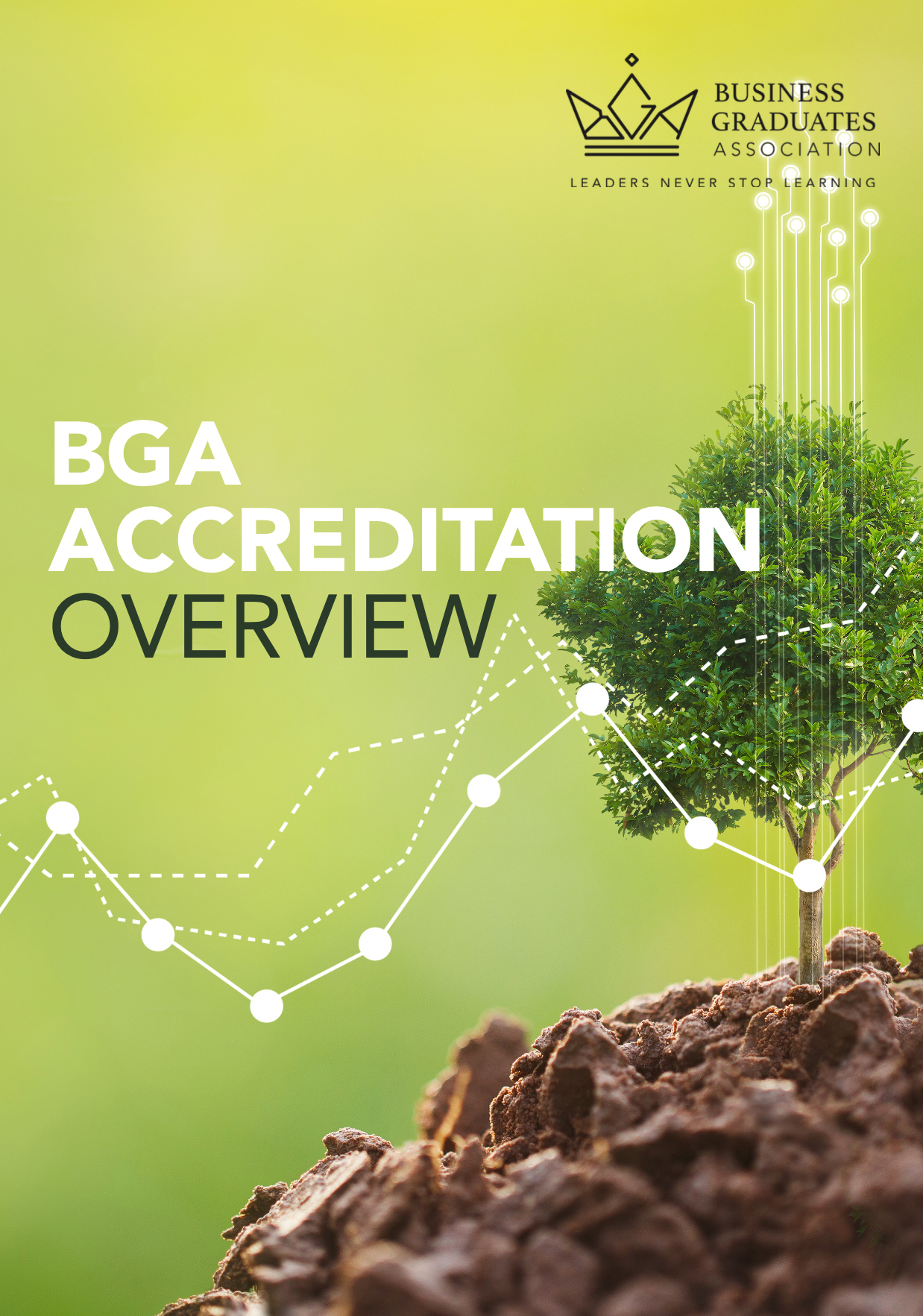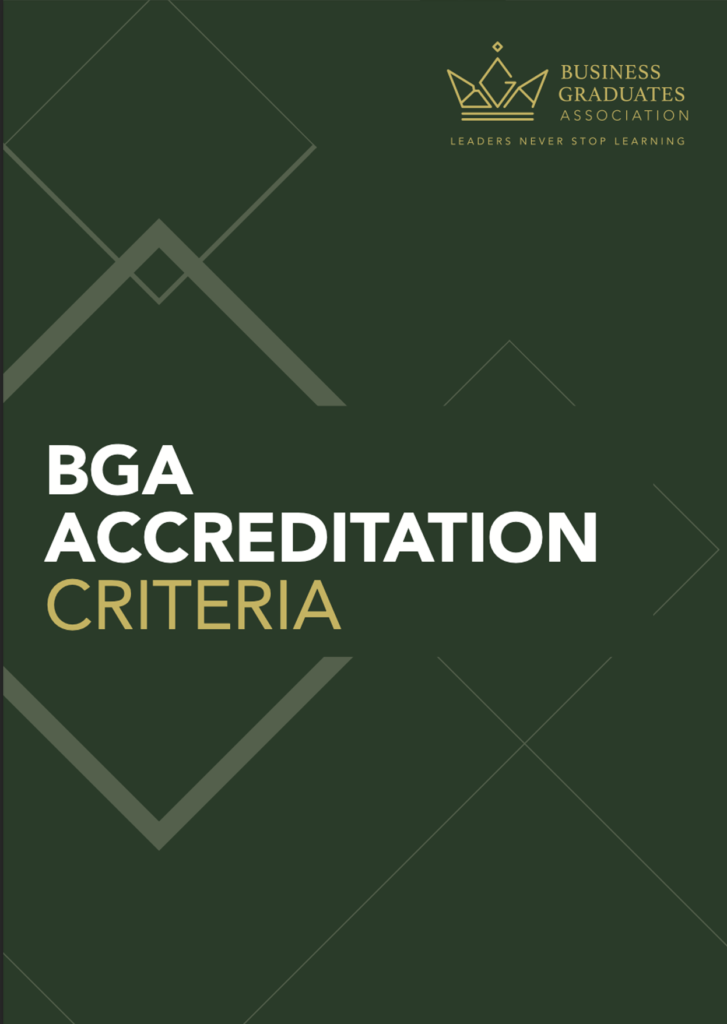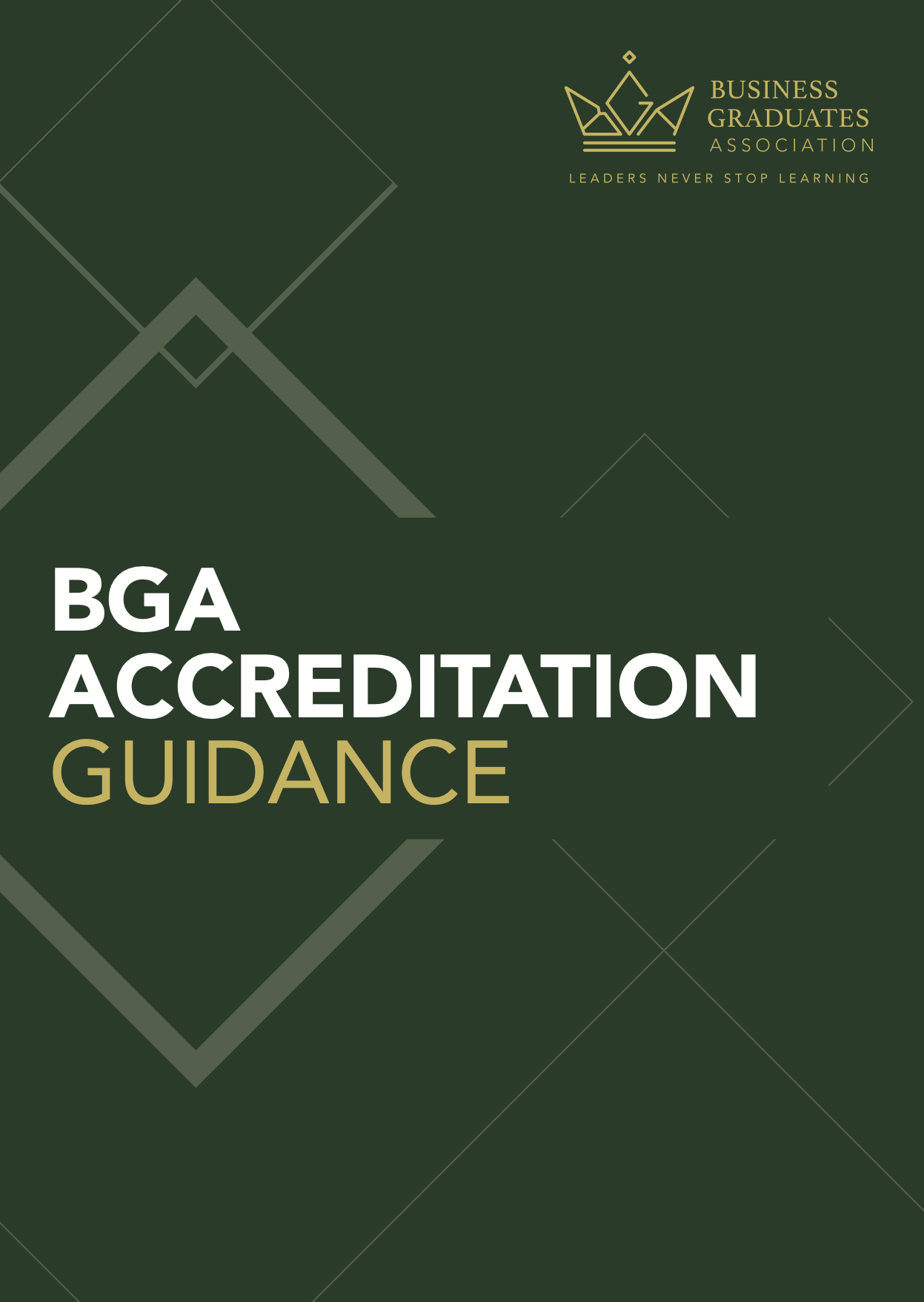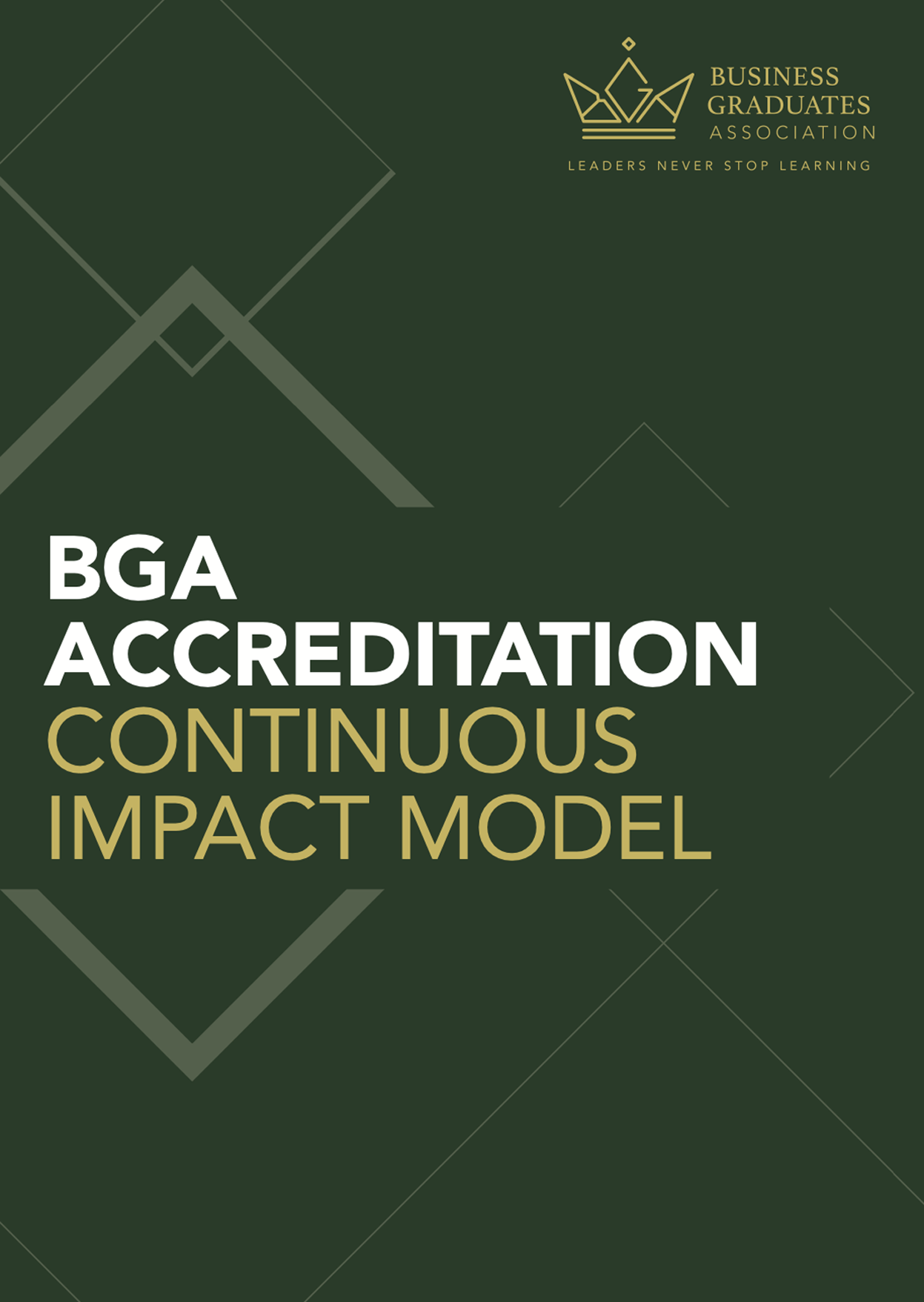A non-prescriptive, whole-school accreditation that is focused on positive impact responsible management and lifelong learning
What is BGA Accreditation?
BGA accreditation is a consultative and non-prescriptive quality assurance achievement awarded to business schools that can clearly demonstrate an increasing impact on their students and communities over a measurable period. All accredited business schools use BGA’s Continuous Impact Model (CIM), which assesses the improvement in impact across a range of metrics that align with the business school’s own objectives.
This business school accreditation is designed to provide both quality assurance and quality enhancement mechanisms for institutions worldwide. This ensures the value of the qualification for potential students, graduates, employers and society. Accreditation plays a key role in informing prospective students and employers about the quality of the institution and its programmes.
The criteria used for the accreditation of business schools are based upon the BGA Charter, and outline the standards that institutions are expected to meet in order to be awarded accredited status by BGA.
BGA accreditation is focused on positive impact, responsible management, and lifelong learning
Rigorous, holistic quality assurance with meaningful criteria
BGA accreditation is a holistic and rigorous institutional accreditation for business schools with a focus on continuous improvement, positive impact, and responsible management.
We use BGA’s accreditation criteria as a benchmark for assessing the overall quality of an institution, it also recognises the need to compare international standards while taking into consideration local legislative and cultural differences.
Derived from BGA’s Charter, the UN’s 17 Sustainable Development Goals inspired BGA’s accreditation criteria. From this, we have adapted the criteria to fit current and future employer needs.
Continuous Impact Model
A key element of BGA’s accreditation is the use of BGA’s ‘Continuous Impact Model’, a unique process which is designed to support accredited business schools to develop an understanding of their impact on stakeholders. The model measures the changes of impact variables over time and establishes evidential feedback loops to improve the quality of the institution and its activities in a continuous improvement process.
Schools are required to undergo the CIM once they begin the accreditation process. The business school’s assigned Accreditation Director and academic mentor play a supportive role in ensuring a school’s development and measurement of its impact metrics are used to meet BGA’s accreditation criteria.
Expert consultants and assessors
Fundamental to BGA’s business school accreditation process is the expert consultation institutions receive. That’s why we’ve selected the best assessors and mentors in the industry to support the enhancement of business schools and their programmes.
Assessors play an instrumental part in the improvement and enhancement of accredited business schools by providing them with active feedback and recommendations. Assessors are also responsible for writing the final accreditation report that highlights the business school’s strengths, weaknesses, recommendations, and overall impact on stakeholders.
Responsible management
Disruptive challenges and obstacles facing businesses include environmental, geopolitical and technological, as well as the traditional business and economic volatilities. BGA’s accreditation process ensures that institutions are equipped to prepare their students to become ethical and responsible managers, fit for tackling the world’s challenges.
Gold status
Business schools that become BGA accredited achieve ‘Gold status’ within the BGA. This denotes the highest standard of achievement in business education, and can be communicated to stakeholders such as students, employers, and faculty with support from BGA’s communications and marketing teams.
Furthermore, accredited business schools are displayed at the top of the BGA business school search and lists, solidifying their status and achievement within the network.
BGA accreditation is focused on continuous improvement, positive impact, and responsible management

Rigorous, holistic quality assurance with meaningful criteria
BGA accreditation is a holistic and rigorous institutional accreditation with a focus on continuous improvement, impact, and responsible management.
BGA accreditation criteria are used as a benchmark for assessing the overall quality of an institution, it also recognises the need to compare international standards while taking into consideration local legislative and cultural differences.
BGA’s accreditation criteria are derived from BGA’s Charter which is inspired by the UN’s 17 Sustainable Development Goals. From this, the criteria have been adapted to fit current and future employer needs.
Continuous Impact Model
A key element of BGA’s accreditation is the use of BGA’s ‘Continuous Impact Model’, a unique process which is designed to support institutions to develop an understanding of their impact on stakeholders. The model is built for Business Schools and measures the changes of impact variables over time and establishes evidential feedback loops to improve the quality of the institution and its activities in a continuous improvement process.
Schools are required to undergo the CIM once they begin the accreditation process. The Business School’s assigned Accreditation Director and academic mentor play a supportive role in ensuring a School’s development and measurement of its impact metrics are used to meet BGA’s accreditation criteria.

Expert consultants and assessors
Fundamental to BGA’s accreditation process is the expert consultation Business Schools receive. That’s why we’ve selected the best assessors and mentors in the industry to support the enhancement of Business Schools and their programmes.
Assessors play an instrumental part in the improvement and enhancement of Business Schools by providing them with active feedback and recommendations. Assessors are also responsible for writing the final accreditation report that highlights the Business School’s strengths, weaknesses, recommendations, and overall impact on stakeholders.

Responsible management
Disruptive challenges and obstacles facing business include environmental, geopolitical and technological as well as the traditional business and economic volatilities. BGA’s accreditation process ensures that Business Schools are equipped to prepare their students to become ethical and responsible managers, fit for tackling the world’s challenges.

Gold status
Business Schools that become BGA accredited achieve ‘Gold status’ within the BGA. This denotes the highest standard of achievement in business education, and can be communicated to stakeholders such as students, employers, and faculty with support from BGA’s communications and marketing teams.
Furthermore, accredited Business Schools are displayed at the top of the BGA Business School search and lists, solidifying their status and achievement within the network.
Eligibility criteria
The business school must be a BGA member
The business school must have been in continuous operation for at least five years
The business school must possess degree-awarding powers
The business school must have graduated at least three student cohorts from one of its programmes
The business school must have audited financial statements showcasing financial sustainability
AMBA & BGA joint accreditation
Combine your AMBA & BGA accreditations into one cost-effective assessment visit by an experienced Faculty of Assessors.
Joint accreditations benefit from having the MBA portfolio and full business school accredited.

BGA accreditation fee
Full business school accreditation with up to 5 years accreditation cycle-
£5,000 - Application stage fee
-
£12,000 - Assessment stage fee
-
£650 annual mentor fee (during development stage)
Does not include travel and accommodation expenses related to the assessment visit
BGA re-accreditation fee
BGA re-accreditation fee with up to five years accreditation cycle-
£12,000 - Assessment stage fee
-
Key downloadable documents
Apply for BGA accreditation
Please download the documents below to apply for BGA accreditation and return them to us via email at bga-accreditation@amba-bga.com. Thank you for your cooperation. Should you require any assistance or have enquiries during the application process, please do not hesitate to contact us.





